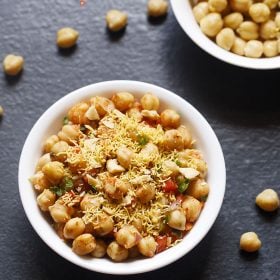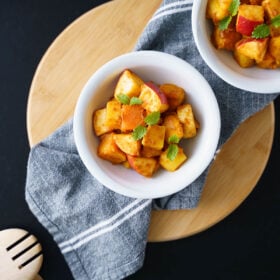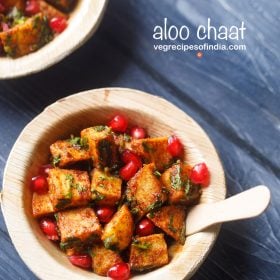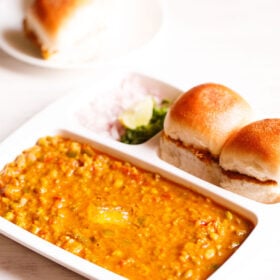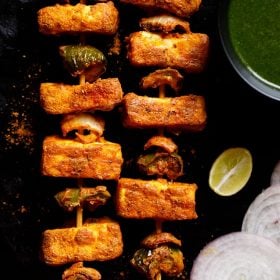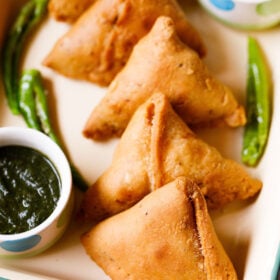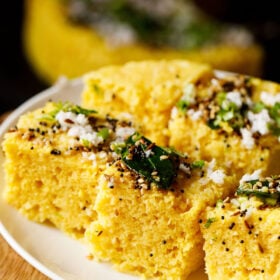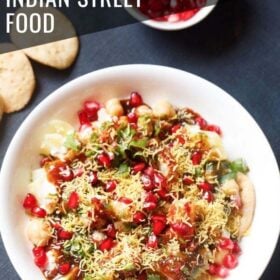Papdi chaat is a popular North Indian street food snack filled with a variety of mouth-watering textures and flavors. Papri Chaat includes chickpeas, potatoes, various chutneys, yogurt, papdi, curd, sev and is garnished with coriander. Serve this tasty dish immediately as a snack.
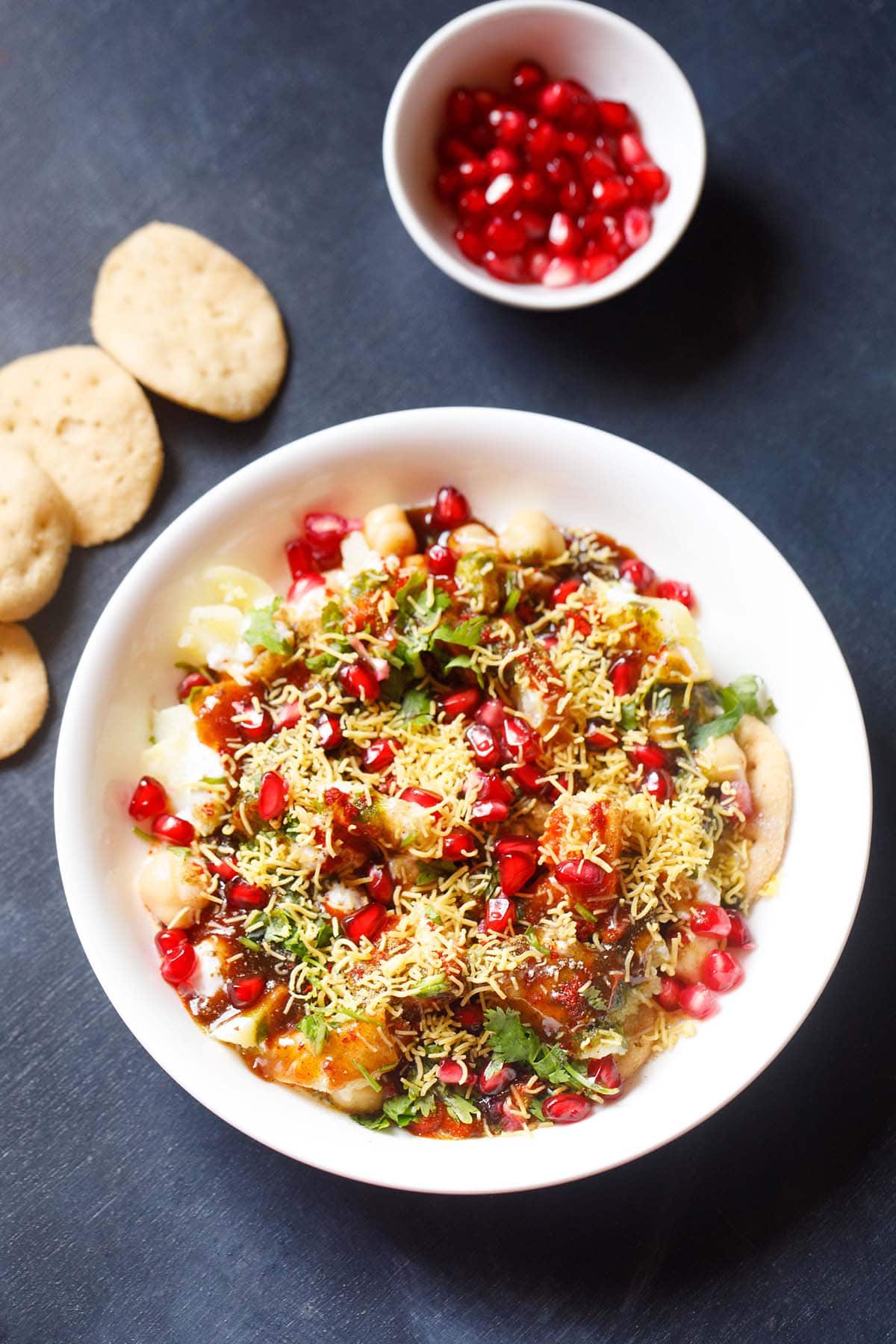
Table of Contents
What is Papdi Chaat
Papdi or papri here refers to crispy fried flour crackers that are made with either whole wheat flour or all purpose flour. Chaat means an array of mouth watering snacks from the Indian cuisine. The word chaat also means to taste or to lick.
Papdi chaat is a popular and delightful North Indian street food snack that is made with papdi (a.k.a fried flour crispies or crackers), boiled chickpeas, potatoes, pakoris (fried black gram fritters), curd (yogurt), spices and various chutneys.
Papdi can be homemade or also store-brought. They are not difficult to make and you also have the option to either deep fry or air-fry or bake them.
Papdi chaat made with baked papdi will be a healthier option. I have earlier shared the recipe for both fried and baked papdi. You can check it here at Papdi Recipe.
I still remember tasting Papdi chaat for the first time in a Punjabi restaurant in Mumbai and it was truly one of the best I had ever had!
Being a true blue Mumbaikar, I have always made Sev puri, Pani puri, Bhel puri, Dahi puri at home, but I had never made papri chaat so I decided to give it a try.
In this recipe I have used all the ingredients except the Urad dal pakoris (urad dal fritters). The pakoris are made exactly like the bhalla made for Dahi Bhalla. I did not have time to make the urad dal pakoris.
If you decide to make the pakoris, then after deep frying them, let them cool and then soak them in water for some time. Squeeze the water from the pakoris and add it to the papdi chaat before you top it with the curd and the chutneys.
Papdi chaat is not difficult or time-consuming to make and can easily be made at home. The first time I made chaat papdi I was really impressed and it tasted exactly like the one from the restaurant.
How to Make Papdi Chaat Recipe
Cook Chickpeas and Potatoes
1. Start by prepping the ingredients for papdi chaat. You’ll need cook dried chickpeas or canned chickpeas. I prefer to use cooked chickpeas, so I always soak them overnight or for 8 to 9 hours in water.
Rinse 1 cup of chickpeas a couple of times in fresh water. Then soak them in 3 cups of water overnight or for about 8 hours. Below is the photo of overnight soaked chickpeas in water.
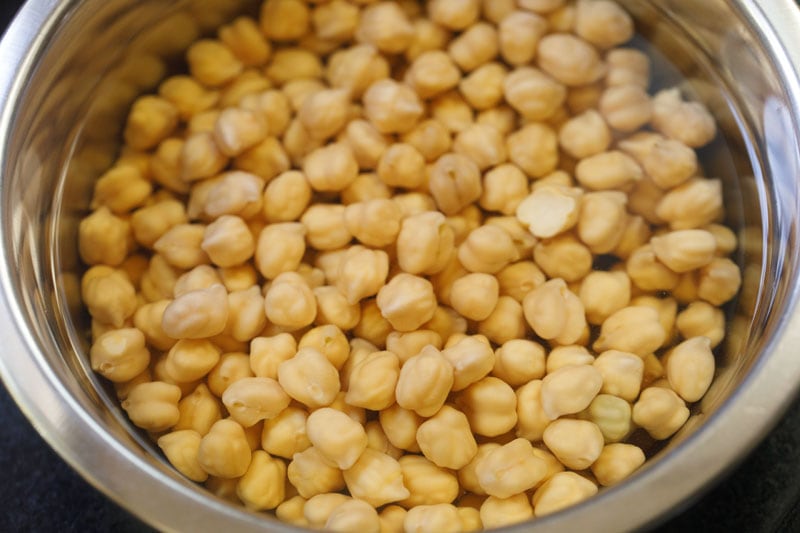
2. Once the chickpeas have soaked rinse them again, drain the water and add the chickpeas to a 2 litre stovetop pressure cooker with ½ teaspoon of salt.
Alternatively, if you are using canned chickpeas rinse and drain the water. Measure to get 2.5 to 3 cups of canned chickpeas and then move to step 10.
But you will need to cook the potatoes if you plan to add them. So either steam them or cook in a pan or pot.
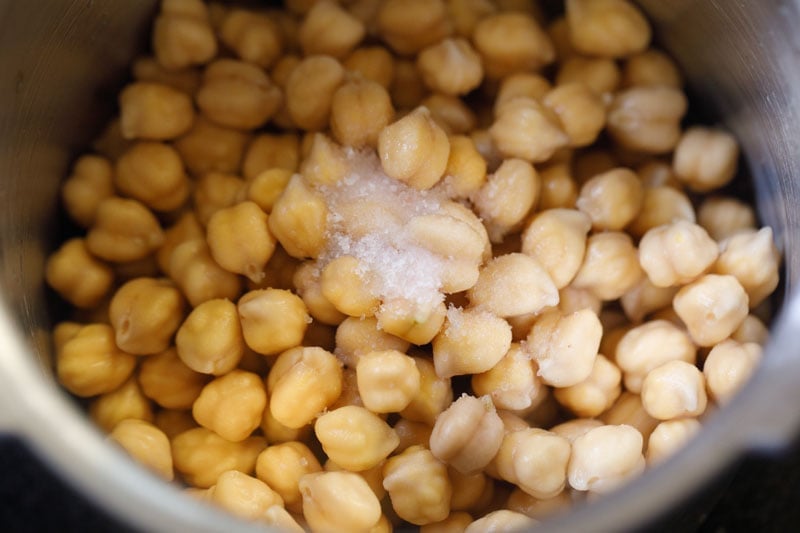
3. Add 2 cups of water.
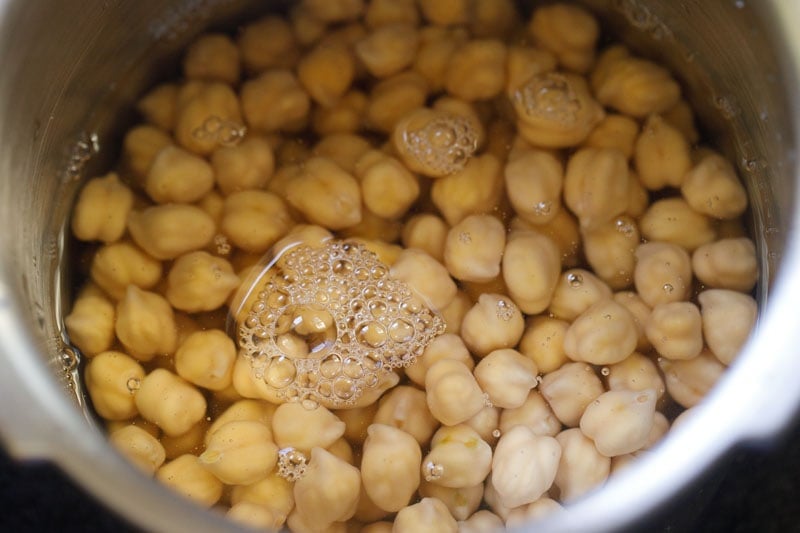
4. Place a steel bowl on the chickpeas in the cooker. Then rinse and place 1 medium-sized to large potato inside the bowl. The potato and chickpeas will be cooked together.
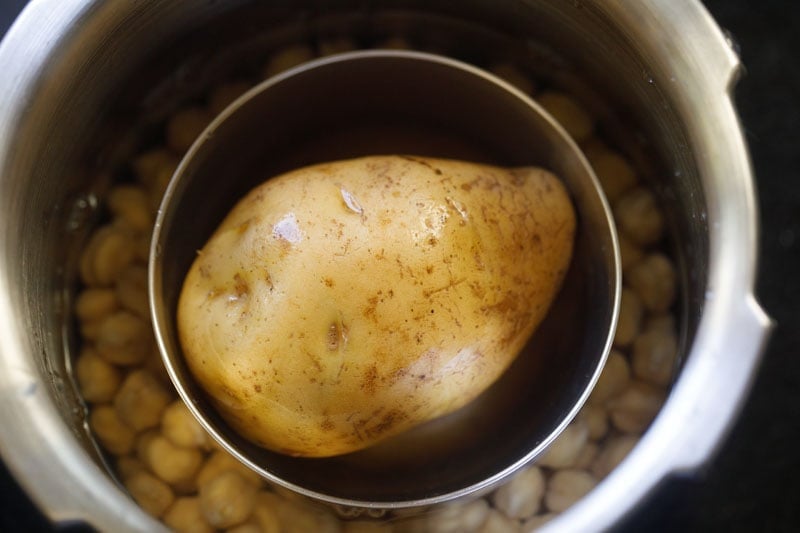
5. Cover the cooker tightly with the lid and pressure cook on medium heat until the pressure starts building and you hear the hissing sound in the cooker.
Then lower the heat a bit and pressure cook for 10 to 12 whistles.
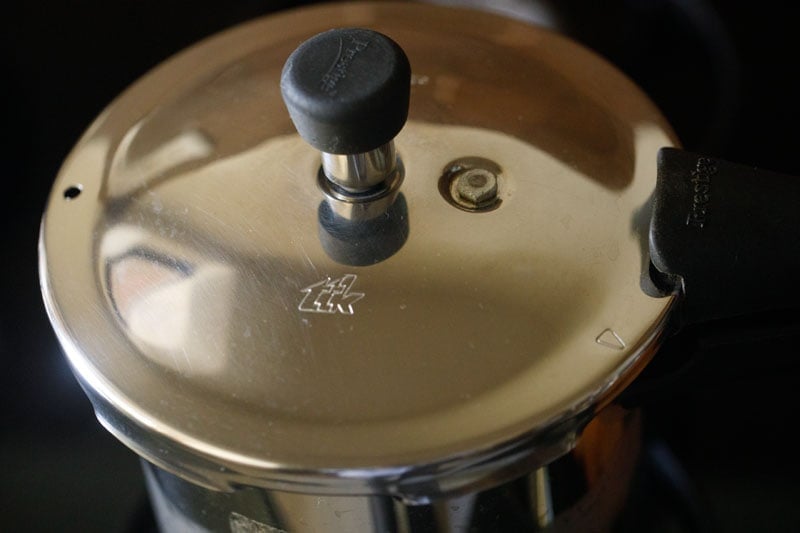
6. When the pressure settles on its own in the cooker then only remove the lid.
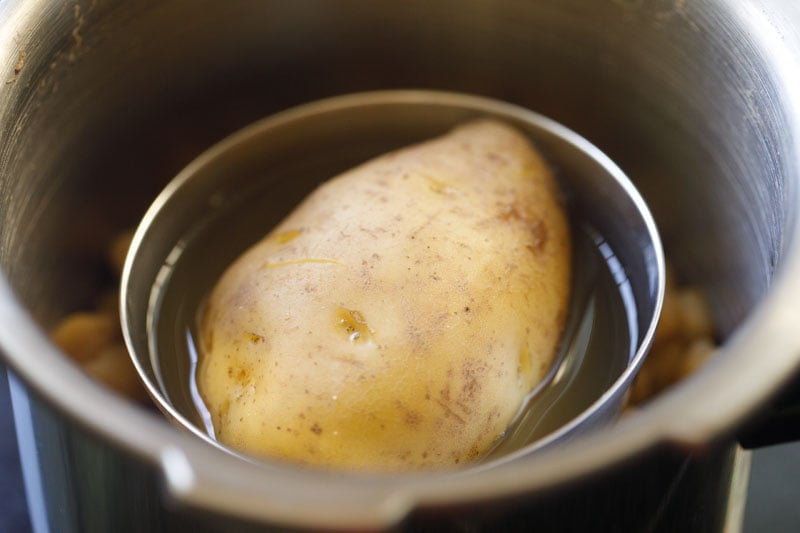
7. Check the potato by piercing it with a knife or fork. It should be tender and softened and the knife should easily pass through it.
Lift the potato with a pasta tong and set it aside to cool at room temperature.
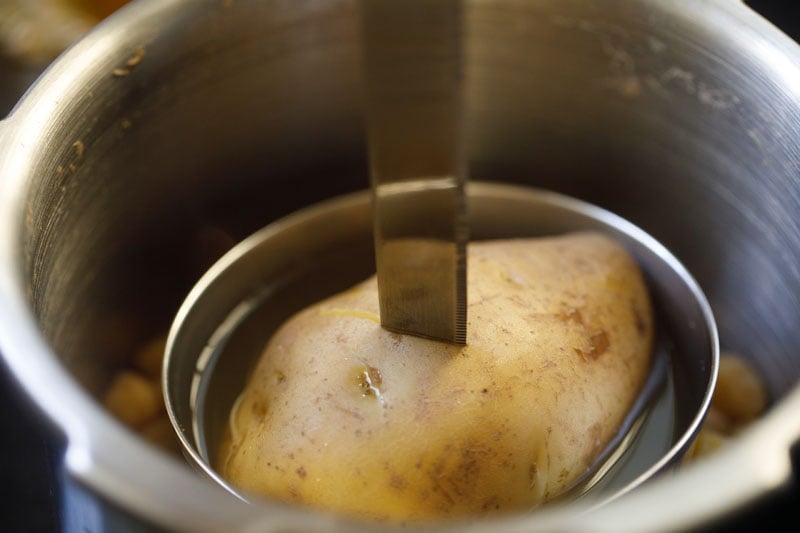
8. Check to see if the chickpeas are cooked. They should have a soft melt-in-the-mouth texture.
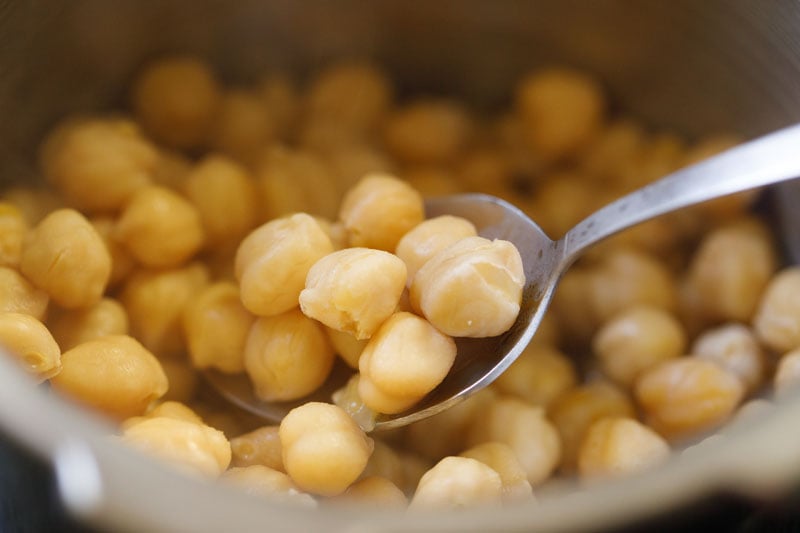
9. Drain the water and set the chickpeas aside.
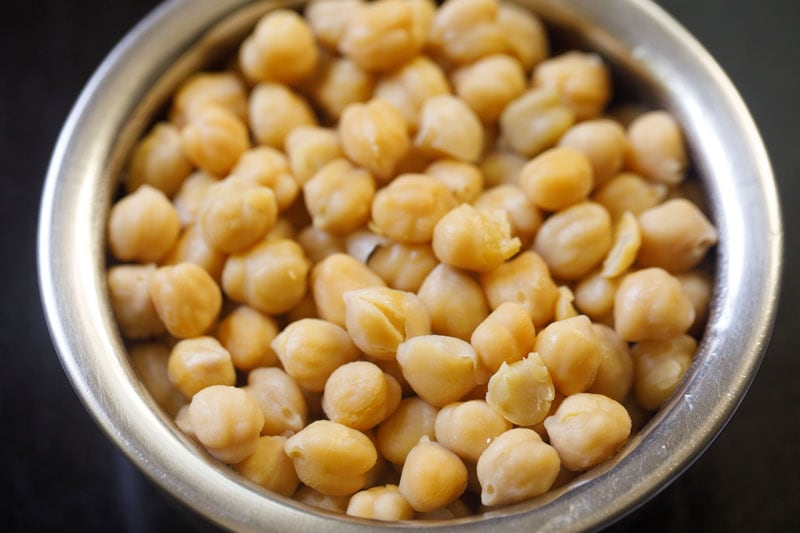
More Papri Chaat Prep Work
10. Prep the chutneys for the chaat. Make them a day ahead or make them while the chickpeas are cooking. The chaat chutney recipes are listed in the recipe card below.
You can add green chutney and tamarind chutney. But feel free to skip the red chili chutney if you don’t like your papri chaat to be spicy and pungent.
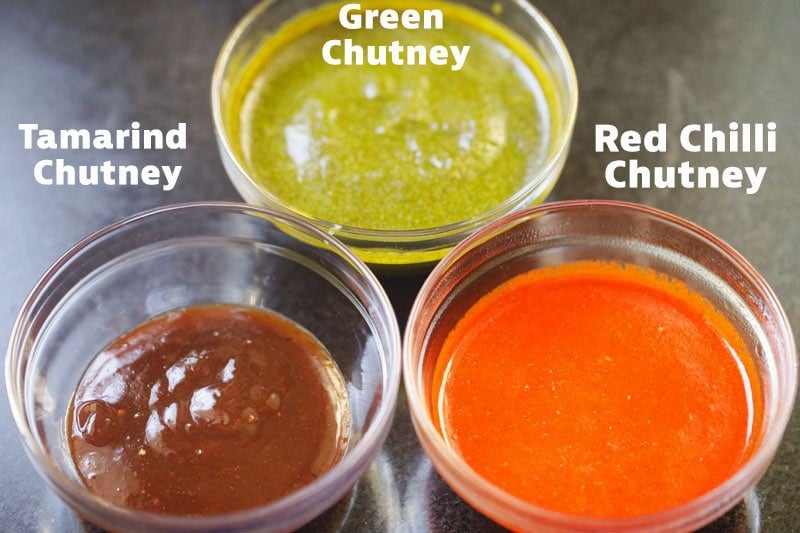
11. Once the potatoes are warm peel and chop them into small cubes.
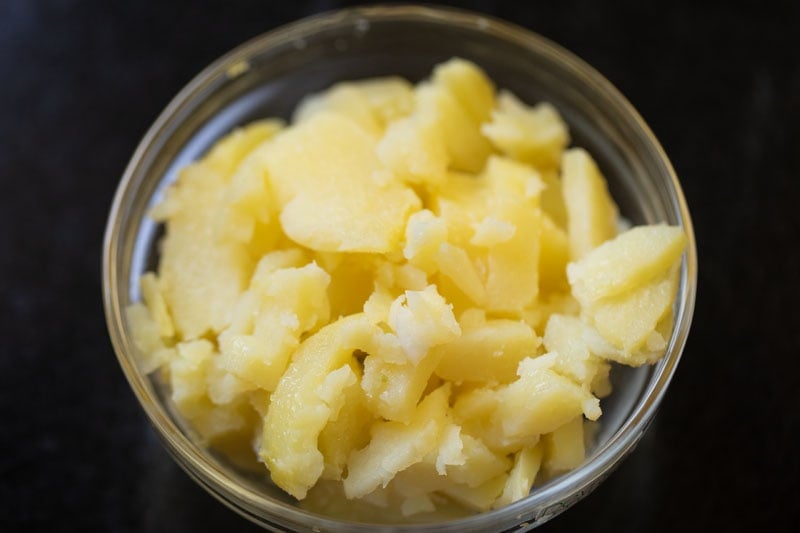
12. In a separate bowl, beat 1 cup of curd (yogurt) using a spoon or wired whisk until smooth.
Ideally the yogurt is cold or chilled when making papdi chaat. But you can opt for a room temperature yogurt.
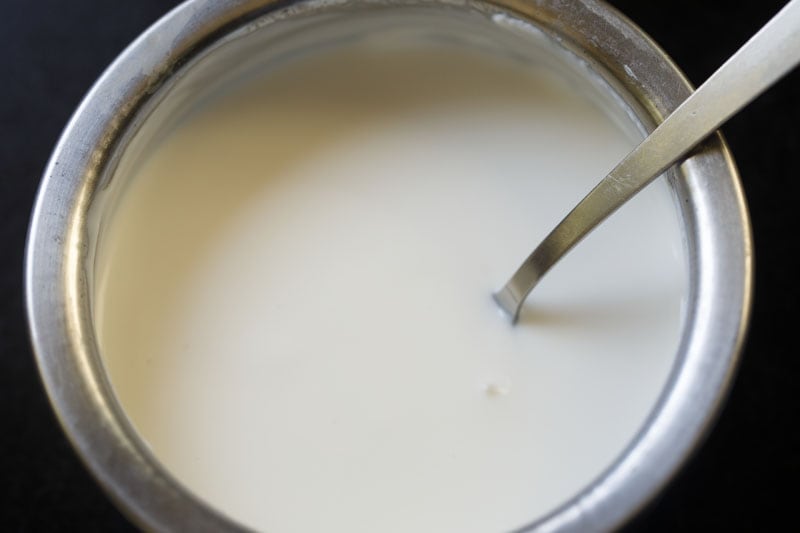
Make Papdi Chaat
13. Arrange 6 to 8 papdi in a shallow bowl or plate.
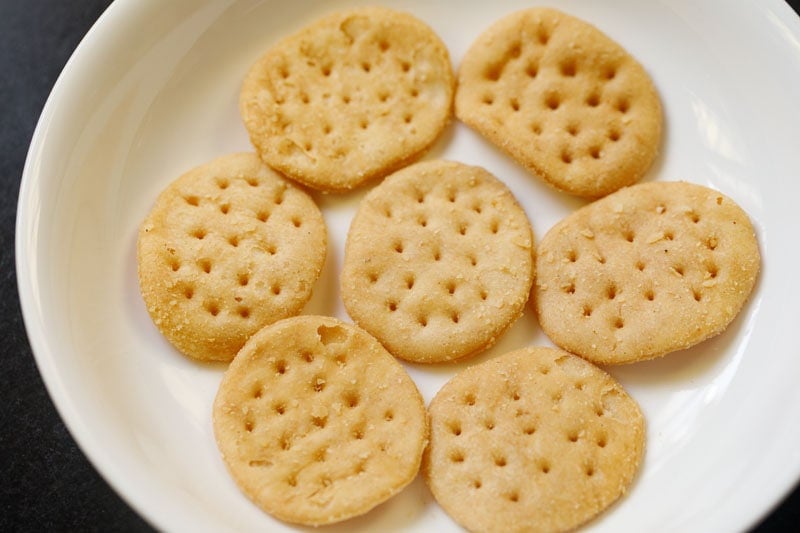
14. Top the papdis with boiled potatoes and boiled chickpeas. At this stage, you can also add some finely chopped onions and tomatoes.
Onions add a delicious crunch to the chaat papdi while tomatoes add a sweet tangy flavor.
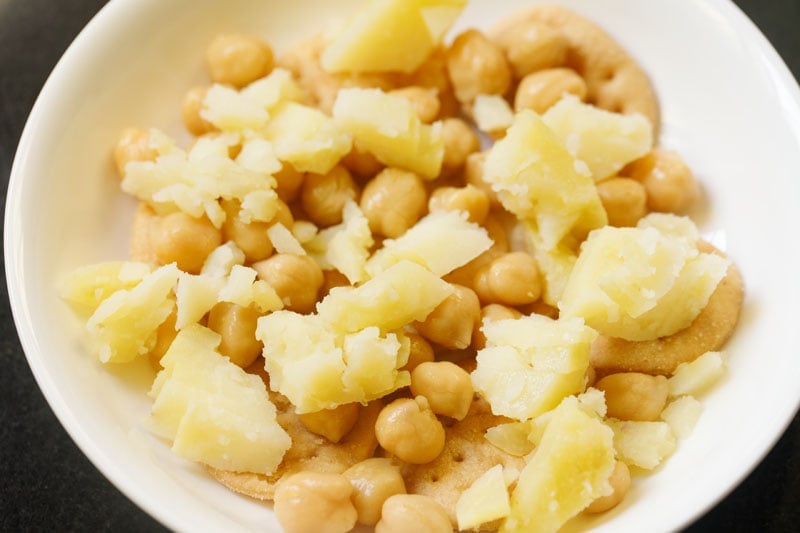
15. Add a generous amount of freshly beaten curd.
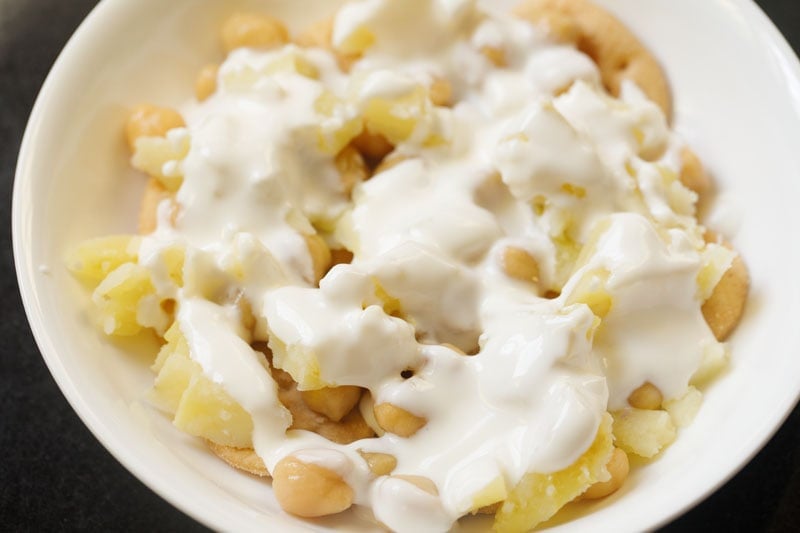
16. Add 1 to 2 tablespoons of green mint coriander chutney, 2 to 3 tablespoons of sweet tamarind chutney and 1 to 2 teaspoons of spicy red chili garlic chutney.
Tip: Feel free to add less or more of each chutney depending on your preferred taste.
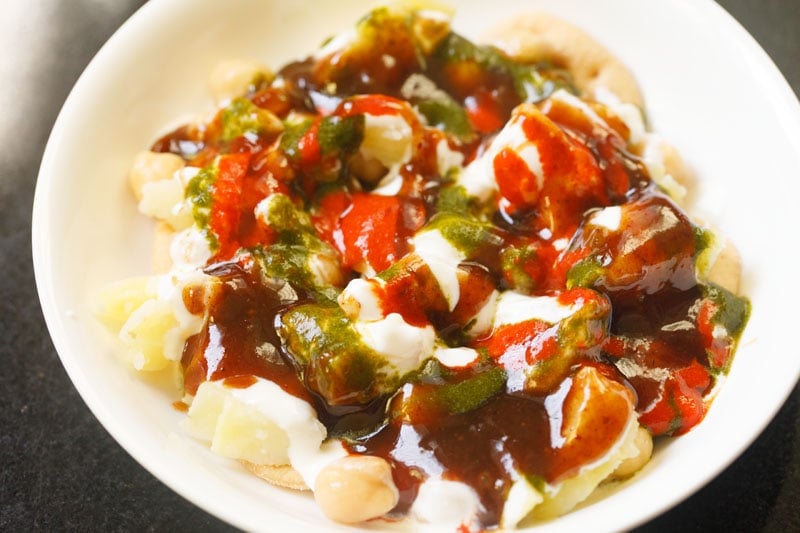
17. Sprinkle a few pinches of ground spice powders such as chaat masala, roasted cumin powder and optionally kashmiri red chilli powder.
Then season it with a few pinches of black salt or regular salt.
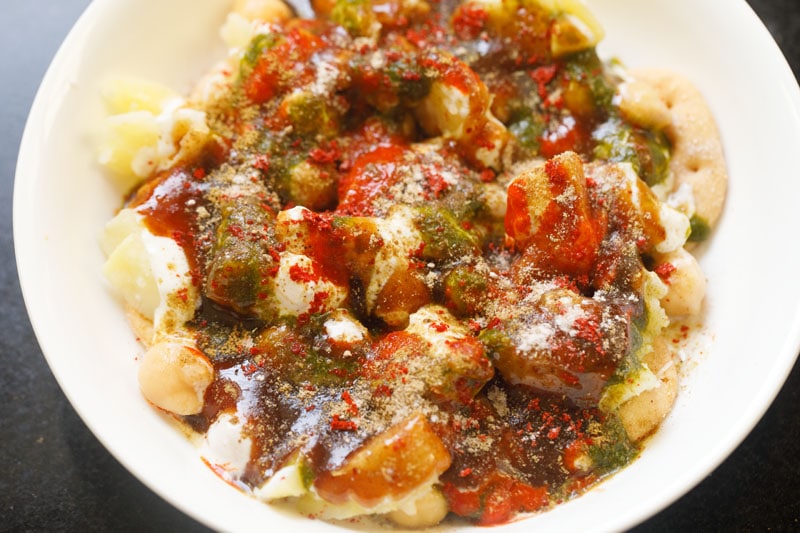
18. Garnish papdi chaat with chopped coriander and pomegranate seeds to add beautiful colors and delicious textures.
If you do not have pomegranates then skip them.
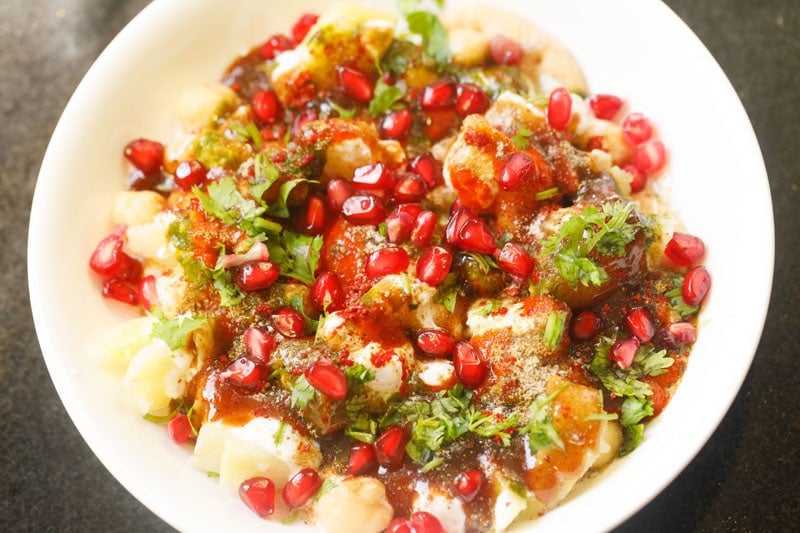
19. Opt to add sev for some color and crispiness.
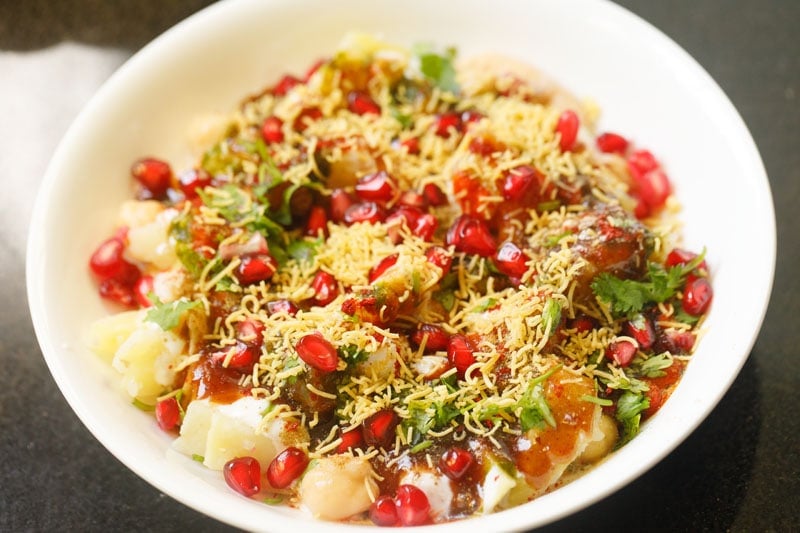
20. Serve papdi chaat immediately to ensure that it stays crispy. If papdi chaat is left for too long it may become soggy.
This way you can assemble the papdi chaat for your family or friends. Or choose to fill the various chaat elements in separate bowls and place them on the dining table – so that the people can assemble and make the papri chaat for themselves.
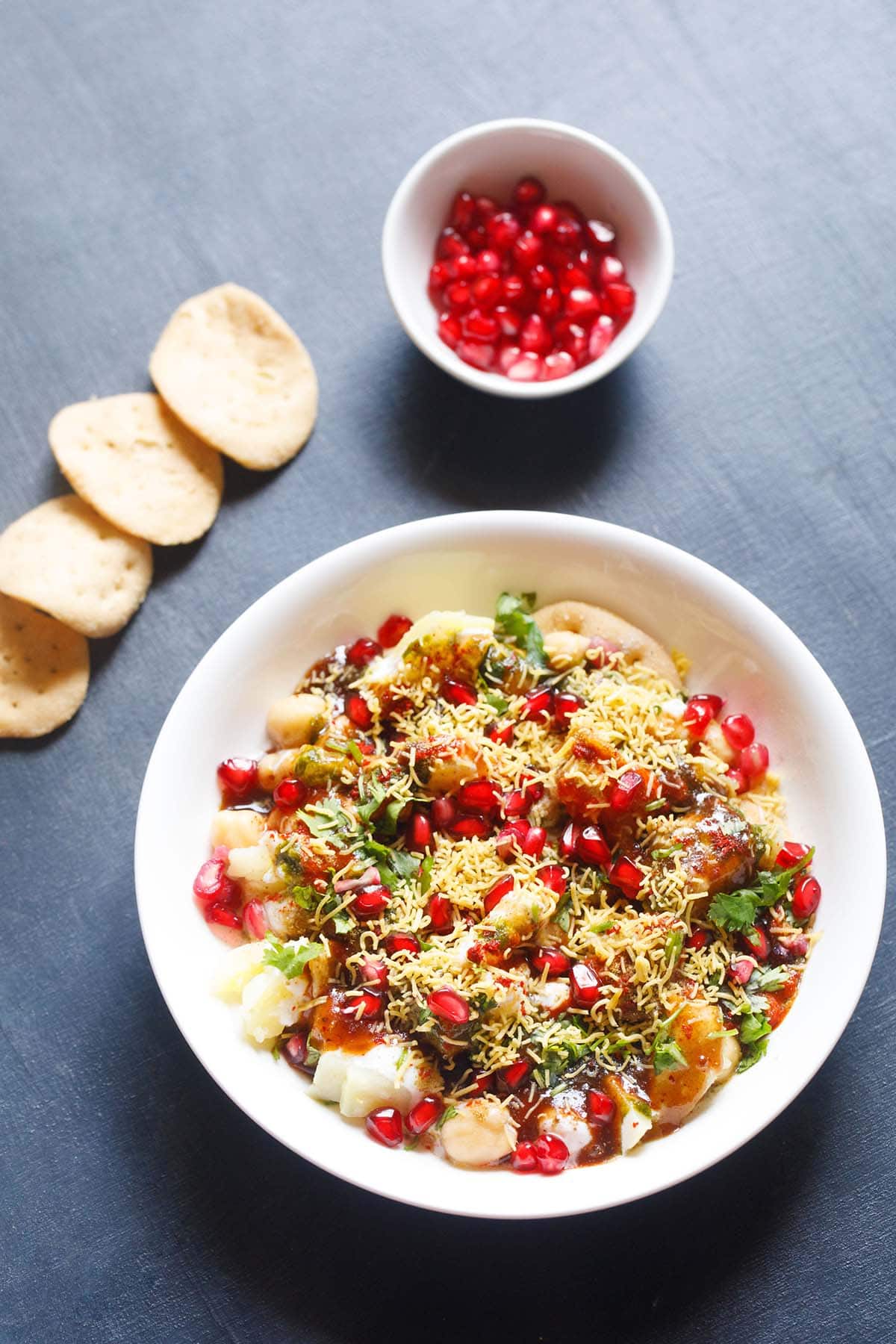
Expert Tips for Chaat Papdi
- Healthy papdi: If you would like to make healthier papdis bake them instead of frying them. This will result in less greasy papdi. To make papdi chaat even more nutritious add fruits like unripe raw mango or pomegranate arils and vegetables or lentils like grated beets or carrots and cooked moong sprouts.
- Serve: To get the best results serve the papri chaat straight away. Avoid leaving it out for some minutes because it will become soggy and won’t be as enjoyable.
- Substitutions: If you don’t have pakoris then feel free to substitue it with boondi. Before adding the boondi to the papdi chaat, soak the boondi in water and squeeze the water from the boondi.
- Variation: It is very easy to customize aloo papdi chaat to your taste. For example, omit the pomegranates if you don’t have any to hand, add less or more of your favorite chutney and add sev for extra crispiness. It is completely up to you!
Papri Chaat FAQs
Yes, it is better to let the guests assemble the aloo papdi chaat because they will become soggy if they are left out for some minutes.
For assembling add spice powders and salt, curd, cooked chana and boiled potatoes in separate bowls. Make sure you place the bowls in the correct order.
Papdi are made with whole wheat flour or all purpose flour and sometimes spiced cumin or carom seeds or both. They are small round savory crackers that are deep fried.
You can buy them in grocery stores or supermarkets or sweets shops if you live in India or make at home. If you live outside then look for them in Indian grocery stores or buy online.
Papdi is often added to chaat snacks like bhel puri, ragda chaat, sev puri and dahi bhalla. They can also be eaten as is like a crispy cracker or served as a side with a cup of Indian chai.
Some of the elements of papdi chaat like chickpeas, veggies, chutneys, curd are healthy. If you make this snack with baked papdi and baked sev or omit the fried sev, then it becomes healthy.
Yes, papdis are available in some Indian grocery stores but you can also make them at home if you have time.
More Tasty Chaat Recipes
Snacks Recipes
Indian Street Food Recipes
Indian Street Food Recipes
Gluten Free Recipes
Please be sure to rate the recipe in the recipe card or leave a comment below if you have made it. For more vegetarian inspirations, Sign Up for my emails or follow me on Instagram, Youtube, Facebook, Pinterest or Twitter.
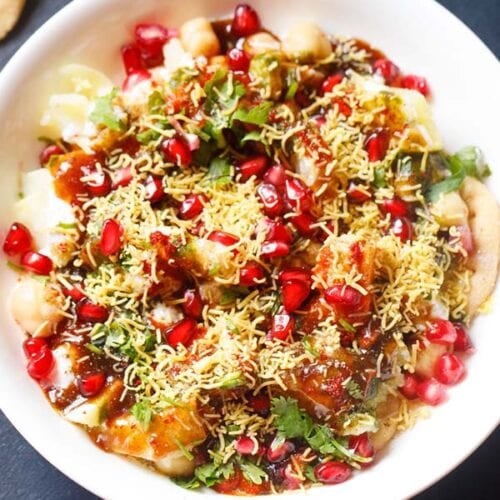
Papdi Chaat Recipe | Papri Chaat (Street Style)
Ingredients
For Cooking Chickpeas, Potatoes
- 1 cup dried chickpeas – swap with 2.5 to 3 cups cooked or canned chickpeas
- 2 cups water – for pressure cooking chickpeas
- ½ teaspoon salt
- 1 potato – medium to large
For Papdi Chaat
- 24 to 30 papdi crispy puri or flour crackers
- 1 cup curd (yogurt) – whisked till smooth, cold and fresh
- 1 onion small to medium, finely chopped – optional
- 1 tomato small to medium, finely chopped – optional
- ¼ cup chopped coriander leaves
- ½ cup Mint-Coriander Chutney – recipe ingredients and method below
- ½ cup tamarind dates chutney – recipe ingredients and method below
- ¼ cup chilli garlic chutney – recipe ingredients and method below, optional
- 1 teaspoon kashmiri red chili powder – optional
- 1 teaspoon roasted cumin powder
- 1 to 2 teaspoons chaat masala
- 1 teaspoon black salt or edible rock salt or regular salt, add as required
- ¼ to ⅓ cup pomegranate arils – optional
- 1 to 2 teaspoons lemon juice or lime juice, optional
- ½ cup sev – optional
For Green Mint Coriander Chutney
- 1 cup chopped mint leaves
- ½ cup chopped coriander leaves
- 1 green chili chopped or add as required
- 1 to 2 teaspoon lemon juice or lime juice – preserves the green color of the chutney
- salt as required
For Sweet Tamarind Dates Chutney
- ½ cup tamarind
- ½ cup seedless dates
- ½ cup jaggery
- ½ teaspoon dry ginger powder (ground ginger)
- 1 teaspoon Coriander Powder
- 1 teaspoon roasted cumin powder
- ½ teaspoon red chili powder – optional
- 2 cups water or add as required
- salt or black salt, add as required
For Spicy Chilli Garlic Chutney
- 18 to 20 garlic cloves – medium to large sized
- 2 teaspoons kashmiri red chilli powder
- ¼ teaspoon salt or add as required
- 2 to 3 tablespoons water or add as required, for blending or grinding
Instructions
Cooking the chickpeas
- If you wanna add chickpeas to the papdi chaat, then some effort is needed. This is if you don’t want to use canned chickpeas.
- Rinse chickpeas in water a couple of times. Soak them in 3 cups water overnight or for 8 to 9 hours.
- Later drain the soaked water and rinse the chickpeas again a few time. Add the chickpeas to a 2 litre pressure cooker together with water and salt.
- If you want to cook potato, then keep a potato in steel bowl. Place this steel bowl with the potato in it on the chickpeas and water mixture in the cooker. The potato and chickpeas will be cooked together.
- Cover the cooker tightly with the lid and pressure cook on medium heat until the pressure starts building and you hear the hissing sound in the cooker. Then lower the heat a bit and pressure cook for 10 to 12 whistles.
- When the pressure settles on its own in the cooker then only remove the lid.
- Check the potato by piercing it with a knife or fork. It should be tender, soft and the knife or fork should easily pass through it. Lift the potato with a pasta tong and set it aside to cool at room temperature.
- Check to see if the chickpeas are cooked. They should have a soft melt-in-the-mouth texture. Drain the water and set the cooked chickpeas aside.
Making the green mint coriander chutney
- Blend all the ingredients with very little water to a smooth and fine consistency.
- Set aside or refrigerate in a small covered container or jar.
Making the sweet tamarind dates chutney
- Boil the tamarind and dates in water.
- When they become soft add the jaggery and the spice powders and salt.
- Cook further till the jaggery melts.
- Switch off the heat and let the mixture cool.
- Grind the chutney mixture to a fine and smooth paste. Seive the chutney through a strainer if needed. Add more salt if required.
- If the chutney becomes too thick add some water to liquidize it.
Making spicy chili garlic chutney
- Peel the garlic cloves and rinse them in water. Add them together with the kashmiri red chilli powder, salt and water to a small blender or chutney grinder jar or a spice grinder.
- Blend to a smooth and fine consistency without any tiny chunks or bits.
- Transfer the red chutney in a small bowl and set aside.
For assembling papdi chaat
- Arrange 6 to 8 papdi in a shallow bowl or plate.
- Top it up with some of the chopped boiled potato cubes and cooked chickpeas.
- You can add chopped onions and tomatoes at this point, but it is optional.
- Sprinkle some chaat masala, roasted cumin powder and optionally kashmiri red chili powder on it, if you want at this step.
- Top these with whisked cold curd (yogurt) as you like.
- Top it up evenly with 1 to 2 tablespoons of the green chutney as much as you want.
- Then add 2 to 3 tablespoons of the sweet tamarind chutney and 1 to 2 teaspoons of the spicy chilli garlic chutney evenly. According to your taste preferences you can add less or more of each chutney.
- Sprinkle some chaat masala, red chili powder, cumin powder and black salt or regular salt.
- Garnish with coriander leaves and pomegranate arils. Sprinkle sev on top and this step is also optional.
- Add a dash of lemon juice to the papri chaat if you prefer.
- Serve papdi chaat immediately.
Video
Notes
- Swap about 2.5 to 3 cups canned chickpeas or cooked chickpeas with dried chickpeas. Drain the liquids of the canned chickpeas, rinse them and then add to the chaat.
- You can omit making the spicy and pungent chilli garlic chutney. But do make the green chutney and tamarind chutney for the chaat.
- Personalize and customize the chaat according to your likings and taste preferences. Example add more sweet chutney if you prefer a more sweeter taste in your chaat.
- The chutneys can be prepped a day ahead and refrigerated in small covered containers or jars.
- You can halve the recipes of the various chutneys. The leftover green chutney keeps well for a couple of days in the refrigerator. The tamarind chutney keeps well for a few weeks in the fridge.
- For the papdi, make them yourself or if you have time or purchase from stores or shops.
- The recipe can be scaled to make a small batch or a large batch for parties or potlucks.
Nutrition Info (Approximate Values)
This Papdi Chaat post from the archives (November 2011) has been republished and updated on 29 September 2021.
